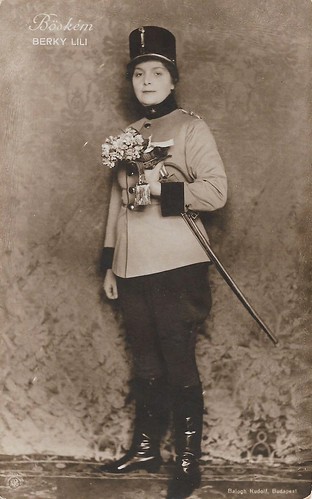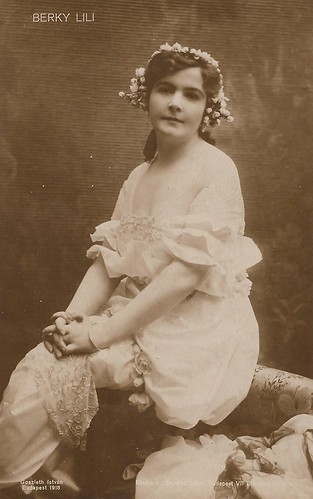
German postcard by NPG, no. 982. Photo: Angelo, Budapest, 1918.

Hungarian postcard by Magyar Rotophot Tarsáság, Budapest, 6 SZ. Photo: Joanovics brothers, Koloszvar, Hungary (now Cluj, Romania).

Hungarian postcard by the magazine Színházi Élet (Theatre Life). Photo: Angelo photos.
One of the first Hungarian films to be exported to other countries
Lili Berky was born Amália Terézia Berky in Gyõrr, Austria-Hungary, in 1886. She was the daughter of theatre director Ferenc Berky (Bauer) and Amália Tóth of Aszod. Lily already acted at the age of 8 and in 1903 she graduated from the Hungarian Royal Dramatic School of Art.
Berky had an intense career as an actress and singer from then on, first at the King's Theatre in 1905-1906, then the Cluj theatre in 1906-1911, the Nepopera (People's Opera) in 1911-1913, in 1915-1919 the Cluj theatre again. And so on and on, until the 1950s, she shifted from one regime to another, often also shifting theatre companies, and continuing to play until her death.
Berky's first big film success was the drama Sárga csikó/The Yellow Foal (Félix Vanyl, 1913) starring Lili Berky, Gyula Nagy and Mihaly Varkonyi (the later Victor Varconi). It was co-produced by the French Pathé and local producer Jenő Janovics. The film was exported to nearly forty countries worldwide.
On the back of the film's massive success, Janovics built his Corvin Film company into a leading studio, attracting talented Hungarian actors, writers and technicians away from the capital Budapest to work for him in Kolozsvár (Cluj).
Berky starred in Michael Kertesz's (Michael Curtiz's) A tolonc/The Exile (1914), opposite Victor Varconi. Also memorable is the silent drama Fehér éjszakák/White Nights (Alexander Korda, 1916), starring Lili Berky, Kálmán Körmendy and György Kürthy. It was based on the play 'Fédora' by Victorien Sardou and is sometimes known by the alternative title 'Fédora'.
Fehér éjszakák/White Nights was Alexander Korda's first film for the Corvin Film studio. It was a major success and was one of the first Hungarian films to be exported to other countries. Korda would continue to direct Berky in various Hungarian films such as Vergödö szívek/Struggling Hearts (Alexander Korda, 1916), Mesék az írógépröl/Tales of the Typewriter (Alexander Korda, 1916), and Mágnás Miska/Miska the Magnate (Alexander Korda, 1916), based on a popular operetta.

Hungarian postcard by NPG (Neue Photographische Gesellschaft). Photo: Istvan Goszleth, Budapest. Lili Berky in the operetta 'A kis kiraly/Der kleine König' by Emmerich Kalman. The operetta premiered in Vienna in 1912.

Hungarian postcard by NPG (Neue Photographische Gesellschaft). Photo: Istvan Goszleth, Budapest. Lili Berky in the operetta 'Böském' (1914) by Béla Tompa.

Hungarian postcard by NPG (Neue Photographische Gesellschaft). Photo: Istvan Goszleth, Budapest. Lili Berky in the operetta 'Böském' (1914) by Béla Tompa.

Hungarian postcard by NPG (Neue Photographische Gesellschaft). Photo: Rudolf Balogh, Budapest. Lili Berky in the operetta 'Böském' (1914) by Béla Tompa.
Hiding because of the anti-Jewish laws
In the 1930s, Lili Berky would often perform in the romantic comedies by Béla Gaál. These films included the comedy Az új rokon/The New Relative (Béla Gaál, 1934) with Zita Perczel, and the drama Ida regénye/Romance of Ida (Steve Sekely, 1934), starring Gábor Rajnay, Irén Ágay and Pál Jávor.
Berky played another supporting part in the comedy Ez a villa eladó/Villa for Sale (Géza von Cziffra, 1935) starring Ernő Verebes, Ida Turay and Gyula Kabos. After he goes away on holiday, a wealthy man's servant accidentally puts his villa up for sale. She played the female lead in the drama Párbaj semmiért/Duel for Nothing (Emil Martonffy, 1940) starring Gyula Csortos.
She played in more than 30 Hungarian sound films, mainly in the 1930s and early 1940s. During the war, her husband, Hungarian actor and comedian Gyula Gózon, had to hide because of the anti-Jewish laws, while she continued to act. Yet, Gózon managed to survive all the changes in regimes.
After the war Lily Berky had minor parts in Hungarian film dramas, of which two were presented in Cannes: A Tanítónő/The teacher (Márton Keleti, 1945) and Különös házasság/A strange marriage (Márton Keleti, 1951) with Miklos Gabor. Her last stage role was as the Archduchess in Ferenc Molnár's 'The Swan', and her final film part was in Az élet hídja/The Bridge of Life (Márton Keleti, 1956).
Lili Berky died in Budapest, in 1958, at the age of 71. She was the wife of the Kossuth Prize-winning actor Gyula Gózon.

Hungarian postcard by NPG (Neue Photographische Gesellschaft). Photo: Szenes-Koller, Budapest. Lili Berky and Ferenc Pázmán in 'Aranyesö'. 'Aranyesö' (lit. Golden Rain) was the title of an operetta composed by Béla Zerkovitz and with a libretto by Adolf Mérei and Izor Béldia, first staged in 1913. Lily Berky performed together with singer/comedian Horthy.

Hungarian postcard by Magyar Rotophot Tarsáság, Budapest. Photo: Alexy, 1914. Lili Berky and Gyula Gózon in the operetta 'Böském' (1914) by Béla Tompa. In the same year, the two stage actors also acted in the film version of the play, directed by Aladár Fodor for the company Kino-Report.

Hungarian postcard by the magazine Színházi Élet (Theatre Life). Photo: Istvan Goszleth, 1918.
Sources: Wikipedia (English, French and Hungarian) and IMDb.
No comments:
Post a Comment